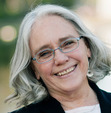Edith Maxwell's Blog, page 88
September 22, 2021
Wicked Wednesday – Dear Diary Day
It’s Wednesday…and we have a fun national day to talk about today. It’s Dear Diary Day and I want to see what your characters’ innermost thoughts might look like. Wickeds, give me a couple sentences from one of your character’s diaries.
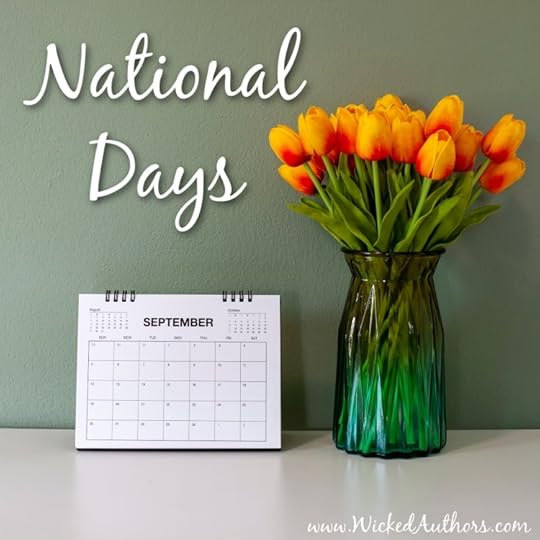
Jessie: Dear Diary, I can scarcely believe I am writing this, but today I took Beryl’s motorcar out on my own for a jaunt! It seems like only yesterday that I was nervously clutching the wheel for my first, admittedly catastrophic, lesson in the drive. How far I have come! You know, being in a motorcar is quite a pleasant experience if one is at the helm! No wonder Beryl loves it so much.
Julie: Dear Diary, it is only on these pages that I will admit this. I dread going to these Christmas Carol readings coming up. Not that I hate the story–far from it. But hard as I try to understand the purpose of three new versions of the story, what I dread most is that it could be, well, painful, to sit through the readings. I can pretend once that it wasn’t as bad as he feared when talking to dear Ernie, but three times? While he’s staying at my house? I fear that this could be a very long holiday season here at Windward. Very long.
Edith: Over lunch today, Amelia and I discussed the horrifying social issue of men mistreating women, particularly when it comes to blows. The topic seems current, but of course such behavior has been going on for time immemorial. In the morning I shall call our journalist friend and see what we can do. Jamie Colby might be able to find Faith Bailey, the reporter who wrote the article prompting our discussions. Or he might have information independent of her. We must do SOMETHING. Now for my last smoke and bed. Goodnight, dear Diary. Until tomorrow. [Written by Dot Henderson, Boston, 1926]
Liz: Today I mastered the art of transporting! I would never admit it to Fiona, but it’s really fun to just show up and throw glitter everywhere. It’s like rolling out my own red carpet. And I haven’t missed since the time I showed up in the house next door to Fiona’s. Lucky no one was home. Now I just have to master handling the Magickal Council and find out who’s trying to frame me for a serious witch crime. Hopefully Grandma Abby left something in her spellbook about that…
Barb: Dear Diary, Livvie and Sonny are going to Portland for Halloween weekend! It’s their first time, ever, away without their kids. Mom’s babysitting for Jack and I’m the backup for Page, who’s going to a sleepover at a new friend’s house. I’m sure she won’t need me, and I’ll spend Halloween sitting alone in my apartment with the lights off, hiding from the trick-or-treaters. After all, what could happen?
Sherry: Dear Diary, This morning I got swept out into the Gulf of Mexico and could have died! Died! It scared me way more than I was willing to admit to anyone and maybe even to myself until this moment. Worse yet, I found evidence connected to my friend Ralph’s first wife. She has been missing for twelve years and Ralph had her declared dead. Apparently, Ralph and his current wife, Darlene, were persons of interest back when his wife first disappeared. Now that is all going to be dredged up again. If only, I hadn’t gotten on that boat.
Readers, give us a glimpse into your diaries to celebrate the day!
September 21, 2021
Welcome Alyssa Maxwell, and a giveaway
By Liz, welcoming Alyssa Maxwell to the blog today! Alyssa is celebrating the recent release of her ninth Gilded Newport Mystery, Murder at Wakehurst, and talking about what makes a good sleuth. Thanks for being here, Alyssa!
Recently, during a chat with Murder by the Book (Houston, TX) I was asked if I thought I would make a good sleuth. Honestly, that was the first time I’d been asked that question! And I had to think about it a minute. I mean, for these past, oh, nearly ten years now, I’ve been honing the art of thinking like a sleuth. But could I actually compile a list of possible motives, follow a trail of evidence, and confront suspects in real life?
First, what is it that makes a good sleuth?
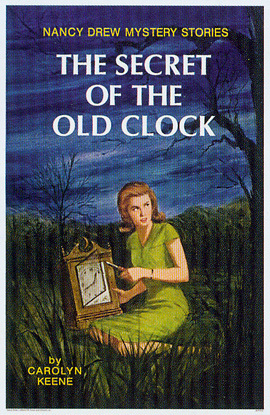
To begin with, our intrepid individual needs to possess an insatiable curiosity. She (we’ll go with “she” here, since my sleuths are all women) isn’t someone who typically accepts things on face value, but thinks about cause and effect, and consequences. She wants to know what’s happening and why, and, in the case of adversity, what might done about it.
A social conscience. Our sleuth has an inner voice that won’t allow her to simply keep walking when something or someone needs her help. She cares deeply about her family and her community.
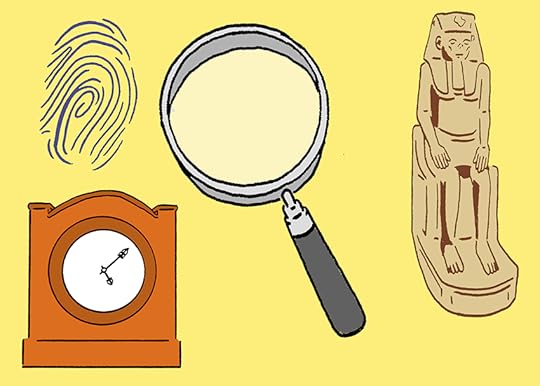
What else? A keen, analytical mind. She must have the ability to see matters clearly, to take into account all aspects of a situation, and understand how various circumstances might fit together to form a picture, even if initially they seem to have nothing in common. She doesn’t believe in coincidences and will work tirelessly to find the ties linking one set of events with another.
A bit of a suspicious mind also comes in handy. That goes back to taking nothing at face value, and includes understanding that words don’t make the person—actions do. So a sleuth always takes a suspect’s claims with a huge grain of salt. Yes, she’ll look for physical clues (body language, facial expressions) as to whether the person is lying or telling the truth, but she also backs up her instincts with evidence. If that means going behind backs to question friends and relations, and a bit of spying and record searching, so be it. Our sleuth is willing to do it, even if she has to make some apologies later.

Hutzpah – a sleuth needs this in spades! Confrontation doesn’t scare her. She has the confidence to stand up to people, to force her way into their lives with her questions and suspicions, and to persevere in the face of anger, insult, and even physical threats. A sleuth needs a love of adventure and a bit of a devil-may-care attitude, or she’ll never have the nerve to do what she must to solve the case. That doesn’t mean she should be “too stupid to live.” No, she should understand the dangers involved and have the necessary back-up if possible – like leaving a note for a friend saying where she’s going – but in the end, danger makes our sleuth’s heart beat faster, and makes her feel alive and self-reliant.
So, would I make a good sleuth? As much as I would love to say yes, the truthful answer is that I much prefer sleuthing in front of my computer, or through the pages of the mysteries I read. I’m not a confrontation person! It’s one thing to put together suspects, motives and clues on paper, but quite another to coerce bad people into confessing to murder. Yes, MURDER! Let’s not forget that. Sleuthing between the pages of a book is fun. Slinking through back alleys at midnight, sneaking into people’s homes, and having it out with a killer at the top of a cliff—not so much!
How about you? Would you try your hand at sleuthing if given the chance, or do you prefer your adventures rather less perilous? Comment below for a chance to win a signed, hardcover copy of my latest Gilded Newport Mystery, MURDER AT WAKEHURST! (open to U.S. residents only due to shipping costs.)

Murder at Wakehurst blurb:
In the autumnal chill of Newport, Rhode Island, at the close of the nineteenth century, journalist Emma Cross discovers an instance of cold-blooded murder on the grounds of a mansion . . .
Following the death of her uncle, Cornelius Vanderbilt, in September 1899, a somber Emma is in no mood for one of Newport’s extravagant parties. But to keep Vanderbilt’s reckless son Neily out of trouble, she agrees to accompany him to an Elizabethan fete on the lavish grounds of Wakehurst, the Ochre Point “cottage” modeled after an English palace, owned by Anglophile James Van Alen.
Held in Wakehurst’s English-style gardens, the festivities will include a swordplay demonstration, an archery competition, scenes from Shakespeare’s plays, and even a joust. As Emma wanders the grounds distracted by grief, she overhears a fierce argument between a man and a woman behind a tall hedge. As the joust begins, she’s drawn by the barking of Van Alen’s dogs and finds a man on the ground, an arrow through his chest.
The victim is one of the 400’s most influential members, Judge Clayton Schuyler. Could one of the countless criminals he’d imprisoned over the years have returned to seek revenge—or could one of his own family members have targeted him? With the help of her beau Derrick Andrews and Detective Jesse Whyte, Emma begins to learn the judge was not the straight arrow he appeared to be. As their investigation leads them in ever-widening circles, Emma will have to score a bull’s eye to stop the killer from taking another life . . .
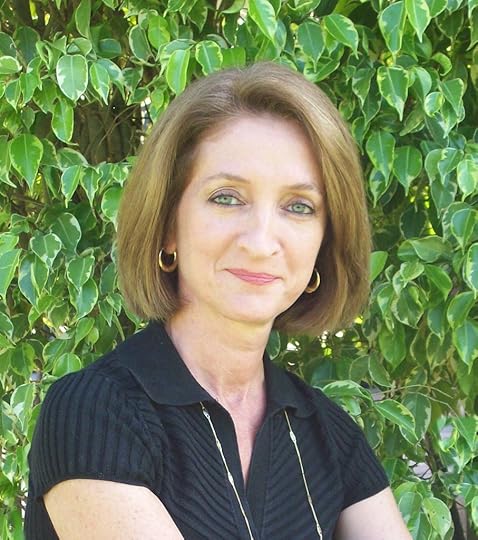
Bio:
Alyssa Maxwell knew from an early age that she wanted to be a writer. Growing up in New England and traveling to Great Britain fueled a passion for history, while a love of puzzles drew her to the mystery genre. She is the author of The Gilded Newport Mysteries and A Lady and Lady’s Maid Mysteries. She and her husband live in Florida, where she is a member of the Mystery Writers of American-Florida Chapter, Sisters in Crime-Treasure Coast Chapter, and the Florida Romance Writers. You can learn more about Alyssa and her books at www.alyssamaxwell.com, where you can also find all her social media links.
September 20, 2021
Cross Cultural
Jessie: In New Hampshire, watching for the first signs of frost.
Every once in a while life delivers up a thoroughly delightful surprise. Meeting German mystery writer, Tatjana Kruse, several months ago, was one such happy circumstance. Both Tatjana and I love to travel and take an interest in other cultures. Recently, we chatted over email about mysteries and writing in each of our parts of the world. I thought it might be fun to share snippets of that conversation with you. So, here it is!
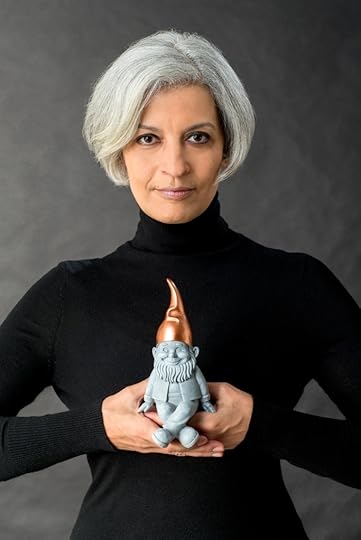
J:So Tatjana, since we live and write in such different settings, I wanted to ask you what the setting is like in your novels? Large city? Quaint village? And is that a frequently used sort of setting in German crime novels?
T: I am currently writing three series: one about the embroidering ex-commissioner Siegfried Seifferheld (he investigates in my lovely medieval hometown of Schwaebisch Hall), the second one about the opera singer Pauline Miller who loves to solve crimes alongside her career (she sings and investigates in famous opera cities like Salzburg and Bayreuth), and last but not least my series about the two elderly snoop sisters who run a bed-and-breakfast way out in the sticks (or as we in Germany sag: in the flat countryside where fox and hare say good night to each other).Localised mystery novels in picturesque tourist regions are very popular in Germany, as are fast-paced thrillers set in big cities. Crime novels are extremely popular in Germany, so that there is now almost no place where a fictional detective is not investigating.
J: That sounds much like the way of things here in the States! We have sleuths going about their business here, there and everywhere!
T: When I think of America, I always imagine a book market that is more commercial than ours. Is there such a thing as a “house publisher” that you stay loyal to? Or do you change frequently? And how much does the publisher look after the authors in terms of signings/readings, marketing and PR? Or do authors have to take care of all that themselves?
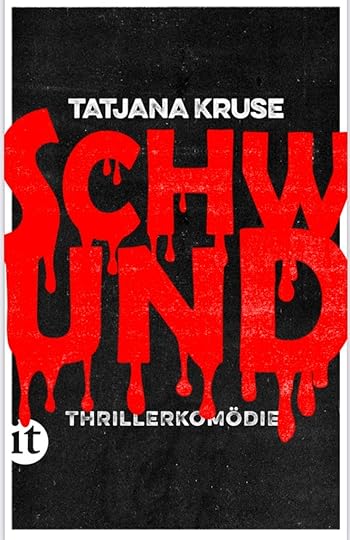
J: That is such an interesting question! In some cases authors are interested in staying with one publishing house. Often they enjoy a supportive and collaborative relationship with their editors and have found that the range of books they wish to write and the the house wishes to publish are a match. For other authors there are stories they wish to tell or experiences they wish to create that are not in alignment with the interests of the house. In those cases more than one publisher at a time can be the answer.
As far as signings, readings, marketing and PR, it also widely varies. Some of the level of support for authors comes from the size of the house. Some of it depends on the importance the house places on the profits the author is projected to bring in. With small houses and for lesser known authors much of that work is handled by the writer. Big houses and well known writers often have more support available.
When I think of Europe, in general, I imagine enthusiastic readers and events involving them. What kinds of events for readers and writers were common pre-pandemic? How about now?
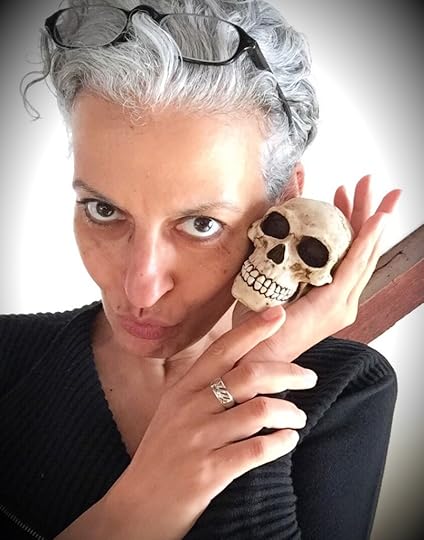
T: We really have a very enthusiastic reading public here. Especially in Germany, we consider ourselves the land of poets and thinkers. Book sales did not collapse during the pandemic, on the contrary. There are an incredible number of crime festivals here in Europe, to which I was always invited before the pandemic. And the reboot is also just starting again. I’ve just come back from a reading in Switzerland and I’m already packing my suitcase again for Austria. And soon I’ll be entertaining the mostly German-speaking audience onboard a cruise ship to Iceland.It’s great to finally come in contact with the readers of my books again – although of course I was always in touch with them via my social media platforms during the lockdowns. But live and in colour is simply something else. I am very happy right now!
As a full-time crime writer, I usually write “on commission” – I kill for hire, so to speak. (Only on paper, of course.) That means I get my fee in advance, and in return the publisher is allowed to make a wish – for example, they might wish for a certain plot location. Do you develop your own book ideas and then look for the right publisher? Or do you also develop your book ideas together with your agent and/or your publisher?
J: How fascinating! We have books in the States that are considered “write-for-hire” which means a flat fee is given in exchange for a book being written and often such contracts involve an idea that the house has in mind. It can be extremely specific or far looser, depending on the house. In other cases the writers come up with a proposal or an entire novel all on their own and their agents send it out on submission. Editors can ask if there is room to negotiate some of the details if they like the general idea but would like to see something tweaked, but the author need not accept the suggestion. There are also some writers who have existing relationships with editors that involve collaborative conversations about possible novels. I think most authors here that are agented discuss the viability of book ideas with their agents, at least to some extent before sending a completed manuscript to them to shop.
Thanks for visiting with me on the Wickeds blog, Tatjana! I love chatting with you!
Tatjana Kruse is a vintage girl from the southern German hillsides. She grew up in beautiful Schwaebisch Hall, where she still lives and works as a full-time writer. She is a member of the Syndikat and PEN Germany.
Since 2000, she has been writing short crime novels (now represented in over 100 anthologies) as well as more than twenty crime novels, including the “Wuchtbrummen” series (Fischer/Goldmann), the “Seifferheld” series (Knaur/Haymon) and the “snoop sisters” series (Suhrkamp-Insel).
She regularly appears at major crime festivals in Germany, Austria and Switzerland, such as Mord am Hellweg, Stuttgart Crime Nights, Crime festival Tyrol, or the Munich Krimifestival.
Tatjana Kruse was awarded the Marlowe of the Raymond Chandler Society for her first short crime story, and the “Fancy Media Prize” for the second. Since then she has also been nominated several times for the Agatha Christie Prize. In 2005 she won the Nordfaelle Prize and as a result became resident crime writer in Flensburg for a summer. In 2010 she was resident crime writer in Wiesbaden. She can be found at:
Facebook: https://www.facebook.com/KrimiKruse
Instagram: https://www.instagram.com/krimi.kruse/?hl=de
LinkedIn: https://www.linkedin.com/in/tatjana-kruse-b532bb43/
Twitter: https://twitter.com/KrimiKruse
Readers, do you have a friend or colleague who lives in another country? Have you ever lived in one? Have you ever wanted to move to a far-flung place?
September 16, 2021
Guest Carol Pouliot
Edith/Maddie here, so happy to have Carol Pouliot back on the blog with a new book and a giveaway! I love what she says about her research.
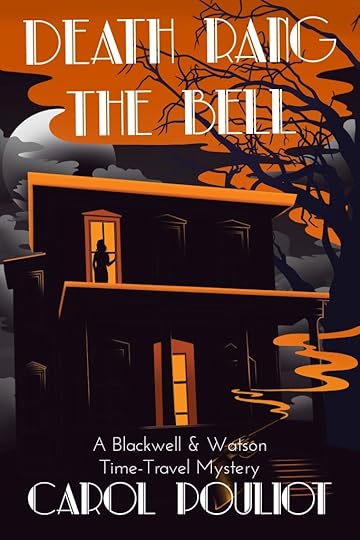
21st-century journalist Olivia Watson thinks traveling back in time to 1934 to attend a Halloween party with her friend Detective Steven Blackwell will be a lot of fun. And it is…until she witnesses the head of the Shipley Five-and-Dime empire murdered, and fears the killer saw her face.
The smart move is to return to the safety of the present, but Olivia possesses a secret and is about to defy the unwritten rules of time-travel. She convinces Steven to let her stay in his time and help unravel the motives behind the murder, even if it means risking her own life to save another.
When Steven delves into the investigation, he discovers how a bitter relationship, a chance encounter, and a fateful decision converged to set the stage for murder. In a maze full of unreliable clues and misdirection, dark secrets refuse to stay buried and forgotten ghosts won’t fade away. Steven is reminded that old sins cast long shadows. Can Steven catch the killer before time runs out for Olivia?
Having Fun with Research
Fun? Yes!
When I began writing The Blackwell and Watson Time-Travel Mysteries, I focused on the murder investigations, time-travel elements, and relationship between Depression-era cop Steven Blackwell and 21st-century journalist Olivia Watson. Then I reminded myself that my books are also historical mysteries because they take place in 1934.
As a kid, the mere mention of history got me yawning. Years later, I made the connection between history and the people who actually lived it. That changed everything.
I began traveling in Europe, visiting beautiful old buildings, drinking in cafés that had been the haunts of famous people, walking the streets where my favorite writers and artists had strolled. I was hooked.
 The couch where Agatha Christie always sat in the tearoom at Brown’s Hotel, London. Brown’s was the model for Bertram’s in At Bertram’s Hotel.
The couch where Agatha Christie always sat in the tearoom at Brown’s Hotel, London. Brown’s was the model for Bertram’s in At Bertram’s Hotel.I love doing research and my book research has been tons of fun. I work mostly with primary sources: photographs, movies, ephemera (menus, ads), artifacts (clothing, cars), and books, newspapers and magazines published at the time. This is where, like an archeologist, I dig for the details that pull readers in and make them feel like they’re living in 1934.
I began with the 1927 edition of The Sears Roebuck Catalogue to furnish Steven’s house, fill his closet, and provide Olivia with a wardrobe for her visits to 1934.
 Steven’s kitchen cupboard from The Sears Roebuck Catalogue
Steven’s kitchen cupboard from The Sears Roebuck CatalogueArchived copies of Good Housekeeping, The Delineator, and Ladies Home Journal show me what beauty products and household items were available to the women in my fictional town Knightsbridge. Studying ads and reading articles, including letters to the editor, provide an insight into how women thought and felt during the Depression.
 Olivia wrote an article for the November 1934 issue of The American Girl magazine
Olivia wrote an article for the November 1934 issue of The American Girl magazineI read local newspapers and The New York Times from the week when each book takes place, pouring over grocery store ads, weather reports, and radio programs. I was thrilled to discover that during the last week of February 1934, the Feds were chasing John Dillinger and his gang. What a perfect subject for my cops to be talking about in Threshold of Deceit!
Automobiles are a big part of my books. In addition to the police vehicles and mortuary van, some of my male characters identify with their cars. Steven loves his 1929 jungle green Chevy sedan, while dapper police photographer Gray Wilson got a brand new 1934 cobalt blue Packard Super 8 Roadster (a gift from his wealthy grandfather) in Death Rang the Bell, and Doc Elliott, the elderly, heavy smoking medical examiner, coughs and sputters in harmony with his old, rundown Model-T Ford.
 1930 Packard 745 Roadster aka “The Deluxe Eight” with 4-speed transmission and adjustable driver’s seat and steering wheel
1930 Packard 745 Roadster aka “The Deluxe Eight” with 4-speed transmission and adjustable driver’s seat and steering wheelEvery summer, the Syracuse Nationals brings thousands of classic cars to town. When I explain that I’m researching my 1934 mystery novels, owners let me sit in the cars, honk the horns, and take pictures. Some have turned on the engine so I can hear how loud the cars were.
I inherited several items from my grandparents, including pieces of Art Deco Depression glass, an aluminum percolator, and, most valuable to me, my grandmother’s photo album. I can see how average people looked and dressed, what their houses and cars were like, and the things they did for fun. Most of all, I treasure what I learned from my Dad, who was 11 in 1934. He gave me priceless insights into his life as a child during the Depression, allowing me to enrich my characters.
I hope you’ll enjoy the 1930s world I’ve created in my books.
Readers: How do you connect with the past? I’ll give away one uncorrected (print) ARC of Death Rang the Bell (US only) to one commenter~
A Francophile at age 11, Carol Pouliot dreamed of going to Paris. After a Master’s at Stony Brook University, she headed to France for her first teaching job. She taught French and Spanish for over 30 years in Upstate New York, and founded an agency that provided translations in over 24 languages. Carol is the author of The Blackwell and Watson Time-Travel Mysteries, including the latest Death Rang the Bell. When not writing, Carol can be found reaching for her passport and packing a suitcase for her next adventure. Sign up for Carol’s newsletter and learn more at http://www.carolpouliot.com

My Fertile Imagination
by Julie, enjoying the waning (sob) days of summer in Somerville
 Once you read the book the wreath will make sense!
Once you read the book the wreath will make sense!When I decided to write a Thanksgiving book for my gardening series, I had a “problem”. How do I incorporate gardening in late fall? Well, after some thought I realized there are a few ways to do it–fall plantings, using the greenhouse, fertilizing rituals. But I also used the opportunity to allow seeds of ideas grow untamed in my imagination.
See what I did there? Seeds, gardening? Prepare yourselves, dear readers. I have a book coming out at the end of the month. The puns will continue.
Anyway, here are the two ideas that took root. 
The first is that there is a wreath making contest held by the library. While technically not gardening, organic materials are used. The wreaths are all inspired by books. Now, I don’t know where that idea came from, but I love it as a library fundraiser. For all I know it was a library fundraiser I read about. But how cool would that be? A wreath inspired by Jane Eyre, or Pride and Prejudice, or Hound of the Baskerville? Or Nancy Drew or Encyclopedia Brown? Or a book by the one of the Wickeds?
The second idea that bloomed was a garden sculpture contest. Did anyone else watch The Big Flower Fight on Netflix? It was a game show competition like the Great British Bake-Off, except with florists and gardeners. I did, and wondered how the Garden Squad would fare on the show. I decided that Roddy and Ernie would be a great team. Lilly would be good for ideas, but terrible for execution. Big floral displays are not how she rolls. But what if the entire Garden Squad entered the competition? That became a subplot of the book.
My fertile imagination, already strong, is helped by local events. I live in a city that celebrates the invention of Fluff, yes that Fluff, with a weekend long festival. What the Fluff? is a great time with food, crafts, music, family fun. Covid has changed it, but it will happen this year. If Somerville can celebrate Fluff, Goosebush can hold a garden sculpture contest.
Goosebush isn’t constrained by reality. One of my favorite things about writing the Garden Squad series is that it is over the top fun for my muse. The ideas that take root can grow in a dozen different ways. There’s really no reason for me to limit them. So garden sculpture contests and book wreaths can fit into a couple of mysteries and planting garlic and putting seaweed on the garden beds. It all works.
Speaking of which–Wreathing Havoc releases on September 28! There’s still time to pre-order–the book will be released in paperback and audiobook. On the day of, I’ll be celebrating the book birthday via Zoom (here’s the link) or on the JHAuthors Facebook page. Here’s the Facebook event if you want to RSVP to get a reminder. The party will run from 7:30pm EDT to 8:30pm EDT, and it will include these fabulous authors:
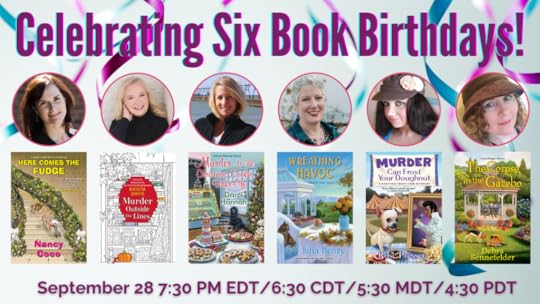
Readers, do you have a local event that tickles your imagination?
September 15, 2021
Happy Birthday Agatha Christie!
We interrupt our regularly scheduled Wicked Wednesday to celebrate Agatha Christie’s birthday! We all have a special fondness for the dame who paved the way for all our stories. So to celebrate, let’s talk about books – specifically, hers!
Wickeds, what was the first traditional mystery (like Agatha Christie’s mysteries) you read? And what was the first cozy mystery you read?
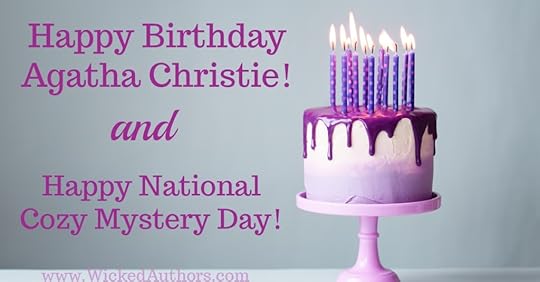
Sherry: Does Nancy Drew count as a traditional? Our house was filled with romantic suspense authors like Mary Stewart, Phyllis A. Whitney, and Victoria Holt. I probably read an Agatha Christie novel along the way, but gasp, I didn’t care for it. I know I need to give her a try now. As for cozy mysteries it would have been either the Cat Who mysteries by Lillian Jackson Braun or the Southern Sister mysteries by Anne George. All of them were delightful.
Edith/Maddie: My mom had shelves of Christie, both Miss Marple and Poirot, that I read my way through, but I have no idea which was the first. Unlike Sherry, I loved them! Happy birthday, Dame Agatha. I also read my mother’s Sherlock Holmes stories, and devoured all of Nancy Drew and Cherry Ames, Student Nurse. As for adult cozy authors, I feel like I discovered Susan Wittig Albert, Diane Mott Davidson, and Katherine Hall Page at the same time in the late 1980s. These three three-named culinary cozy authors captivated me for many, many happy hours of reading, and are a big reason I write the kinds of books I do.
Jessie: Like Edith’s mother, mine also had a huge collection of Christie novels. I am not sure which I read first, but A Mysterious Affair at Styles keeps offering itself to my memory as the first. I do vividly recall reading And Then There Were None under the covers with a flashlight one night when I was 9 or 10 and not being able to sleep because it was so creepy. There was something so macabre about the use of a children’s rhyme that left me rattled. Despite that, or maybe because of it, I read through all the rest of Christie’s novels on our home shelves and any others I could get my hands on. I have a well-thumbed collection of my own now, including that very copy of the one that gripped me so long ago. Thanks, Mum!
Liz: I’m with you on Nancy Drew, Sherry! My mother never had Agatha Christie books either, so when I was young I read all the Nancy Drews and Trixie Beldens. Murder on the Orient Express was the first for me, but I definitely haven’t read the majority of them. I guess I’m adding to my TBR pile! Also like Sherry, I think the first cozies I read were The Cat Who series – and I also loved listening to the audio versions.
Julie: My first Christie was The Murder of Roger Ackroyd. From there I was hooked. I like to think I’ve read them all, but I’m not sure. I have reread several of them with my writer’s brain engaged, and still find her fascinating. Jessie, And Then There Were None. I so agree–the book is so much darker than the movie. And so much better than the recent TV series. My first cozy? It’s been so long, I can barely remember. I do remember visiting my parents for a day, and my mother handing my Janet Evanovich’s first book. I curled up on the couch to read it. I laughed so hard I had to sit up. My mother loves series, and refers to the characters as people to meet. “Have you met Lord Peter? No? You have so much to look forward to!” Happy birthday Dame Agatha! Thank you for the hours and hours of entertainment.
Readers, which Christie book and/or cozy mystery was your first? Leave a comment below!
September 14, 2021
Guest S.C. Perkins – When the Mystery Goes Home
By Liz, happy to welcome S.C. Perkins to the blog today! We also “met” virtually on a St. Martin’s Cozy Con event through Poisoned Pen Press a few weeks ago and I loved listening to her talk about about her series featuring genealogist Lucy Lancaster. I know you’ll all enjoy too!
Thanks so much for having me on The Wickeds today, Liz!
When my third Ancestry Detective mystery, Fatal Family Ties, began to take shape, I knew a few things. First, my genealogist main character, Lucy Lancaster, would be hired by one of her former co-workers. Next, I knew that Lucy worked at a university library in Houston before she moved to her current city of Austin, Texas. What I didn’t know was that I would be taking Lucy on a trip home to Houston as part of the mystery she needed to solve.
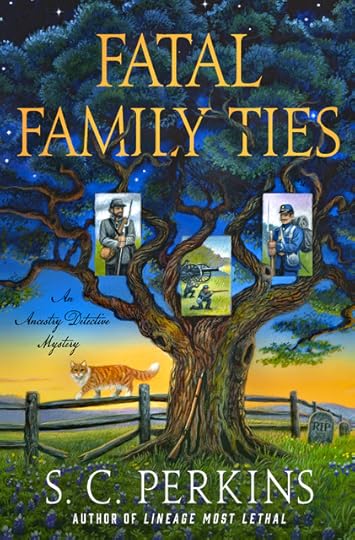
You guessed it, I’m one of those “pantser” writers who writes as the story takes her. So, when I realized how fun it would be for Lucy—and her new FBI boyfriend, Ben—to head to her hometown, I had to decide on the fly where to take her.
But it was a little easier for me because Houston is my hometown as well. Thus, I decided on five of my favorites: two areas of town, two eateries, and one fabulous mystery bookstore.The West University neighborhood – This is one of my favorite neighborhoods in Houston. It’s located west of Rice University and is filled with gorgeous trees and beautiful houses, from sweet, small cottages to huge mini-mansions and everything in between. I decided it’s in West University that Lucy’s former co-worker and current client lives.

The museum district — Located east of West University, it’s home to most of Houston’s world-class museums, including the Museum of Fine Arts, Houston, which makes for a brief setting in the book. The area is also home to my fictional art-conservation building, Morris Art Conservation, where Lucy and Ben take a painting to be evaluated.
Fun fact: I named Morris Art Conservation in honor of my late godfather, Don Morris, who was a talented artist and interior designer.
The Buffalo Grille — This is my favorite breakfast spot in Houston. They also serve an equally good lunch and dinner. I decided Lucy would insist on going with her parents and Ben to her favorite place for breakfast, including some of Buffalo Grille’s fabulous pancakes!
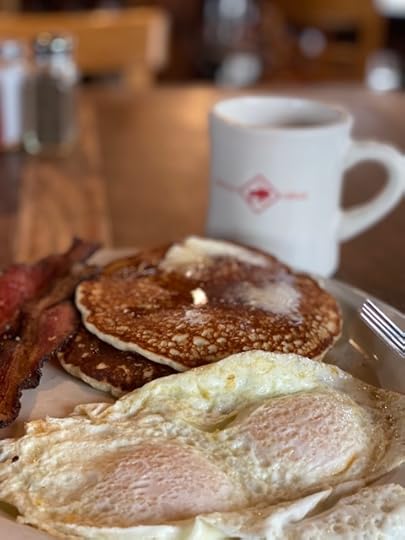
A little spot that only sells warm chocolate-chip cookies – Mine is unnamed and fictional, but it’s actually based upon a real place in Houston called Tiny’s Milk and Cookies. They’re famous for their warm chocolate-chip cookies—though, like my fictional eatery, they mostly sell them with fresh-brewed coffee. After Lucy and Ben get into a little spot of trouble that I won’t spoil for you, Lucy takes Ben there for a little chocolate-chip mood booster.
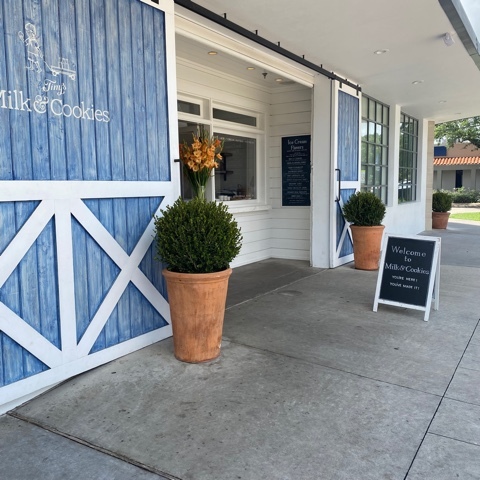
Murder By The Book – What good Houstonian would I be if I didn’t take Lucy to Houston’s famous Murder By The Book, a wonderful independent bookstore specializing in mysteries and all subgenres of crime fiction. It’s also one of my happy places in H-town, as both a reader and an author. Though I didn’t deliberately plan it this way in choosing my other locations, Murder By The Book happens to be located between the West University neighborhood and the museum district, so it was easy for me to have Lucy and Ben make a stop at the bookstore for some good books. I highly recommend a visit there if you’re ever in Houston, or online! http://www.murderbooks.com
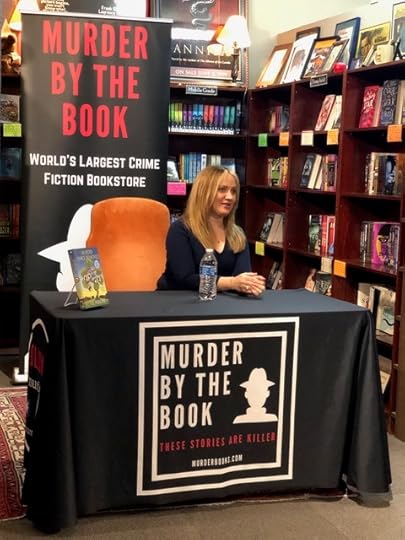
Though I didn’t initially know I would take Lucy to Houston, it turned out I had a blast having her show Ben her hometown through some of my favorite places.
What about y’all? Do you enjoy reading about a character’s—and author’s—hometown?
Bio: S.C. Perkins is a fifth-generation Texan who grew up hearing fascinating stories of her ancestry and eating lots of great Tex-Mex. Her first book, Murder Once Removed, was the winner of the 2017 Malice Domestic Best First Traditional Mystery competition, and an Agatha Award Nominee. She resides in Houston and, when she’s not writing, she’s likely outside in the sun or on the beach.
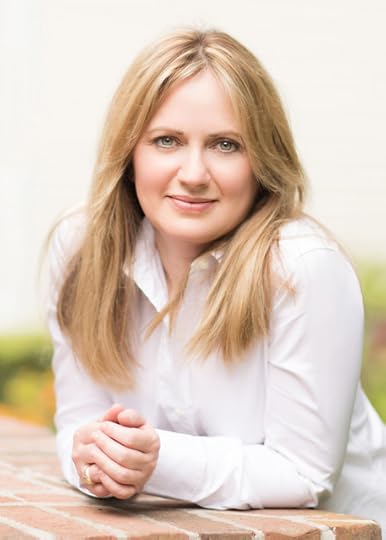
Website: www.scperkins.com
S.C. Perkins’s Fatal Family Ties is the captivating third mystery in the Ancestry Detective series, in which Texas genealogist Lucy Lancaster deals with murders in both the past and present.
Lucy is just about to tuck into a plate of tacos at her favorite Austin joint, Big Flaco’s, when she gets an unexpected visit from her former–and least-favorite–co-worker. Camilla Braithwaite hasn’t gotten much friendlier since the last time Lucy saw her, but that doesn’t stop her from asking a favor. In her hand is a newspaper feature on an ancestor, a civil war corporal–and a liar, according to the article. Charles Braithwaite is depicted as a phony and a deserter, and Camilla wants Lucy’s help clearing his name.
Lucy would prefer to spend her free time with her new beau, special agent Ben Turner, but takes the case, making no promises that Camilla will like the outcome of her investigation. Camilla leads Lucy to the Texas History Museum, where their first clue is a triptych painting, passed down in the Braithwaite family for generations, one panel of which has disappeared. But before Lucy can get much further, a member of the Braithwaite family is murdered in his own bed, and another panel of the painting found missing.
There are no shortage of suspects among the Braithwaite clan–including Camilla herself. This case will take Lucy to Houston and back again as she works to find the truth, and catch an elusive killer.
September 13, 2021
We have met the enemy and he is us
by Barb, in Maine, where it is gorgeous, still warm but fall is in the air
“We have met the enemy and they are ours.”
Master Commandant Oliver Hazard Perry to Major General William Henry Harrison, Battle of Lake Erie, War of 1812
“We have met the enemy and he is us.”
Walt Kelly, Pogo, Earth Day, 1970
Our next door neighbor when I was in middle school and high school, a good friend of my parents, owned a summer place, an old farmhouse on a dirt road with a pond and a bunk house. It was absolutely nothing special, and yet very, very special. When you were there, somehow all your responsibilities seemed to melt away. The rustic nature of the house was part of what made it so, there was no obligation to keep busy. And there was the isolation. It was the perfect place for reading and napping and taking dips in the pond.
 Looking out over the pond
Looking out over the pondOur friend was there one night, sitting in a folding lounge chair, watching the stars, so beautiful in those places where there is no light pollution, when she heard heavy footsteps in the underbrush nearby. She was completely alone. No one would have heard her scream. She waited, stock still, heart banging, until the steps moved off. When it was over, she had the sudden insight that despite all the scary things it might have been, the species she was most afraid of was her own.
The species we are most afraid of is our own. I have thought of this so often. It always informs my mystery writing.
I’ve been thinking about this insight in a different way lately.
Last year Bill and I were very isolated. We fully stayed inside for two weeks before and after we saw our children and grandchildren, who were pretty much the only people we saw. Meal delivery and Netflix was a big night. This year is different. My grandchildren are in school or daycare, my daughter back in the classroom teaching college freshman. Bill and I are going to outdoor restaurants, and ball games, small gatherings with friends, and having house guests.
Our county in Maine is highly vaccinated and our infection rate is low. Still, we are aware that our three granddaughters are unvaccinated. Throughout 2020, before vaccines and effective treatments, our children tended to treat Bill and I, members of a vulnerable age group, like Faberge Eggs. They never would have forgiven themselves if they’d gotten us sick. Now we feel the same way about the youngest members of the family.
My daughter and family have a wedding and a baby shower to attend this fall. I did Books and Boothbay on Saturday, the biggest event I’ve been to in 18 months.
 Books in Boothbay
Books in BoothbayAround every one of these activities and events, there’s a conversation.
“Is it outdoors?”
“Do we know who will be there? Are they vaccinated?”
“Will people be wearing masks?”
And then there is a weighing of risk, and a decision, to go or to decline.
It occurred to me recently: What we are afraid of is people. Not sworn enemies, people out to kill us. People we like and even love. True, these people are merely potential vessels for the real enemy, the virus, but we are in a constant negotiation about our relationships to and interactions with our fellow human beings.
Even some people who don’t normally suffer from social anxiety are finding re-entry freighted. We have to retrain our fight or flee instinct not to react to friends and loved ones. It’s bizarre and maddening and saddening.
We have met the enemy and he is us.
Readers: How are you negotiating this time? I’m not looking for the political. (“Don’t get me stahted,” as we say in New England.) I’m looking for the personal, and if you’re comfortable sharing, the emotional. Let us know in the comments below.
September 10, 2021
Guest Alex Erickson: Troublesome (but Loveable) Felines
By Liz, happy to welcome another Maine coon cat (and all other kinds of cats) lover to the blog! Alex Erickson is here today to talk about how his complicated relationship with his cats…and it’s so hilariously on point! Enjoy!
 Luna says “keep working!”
Luna says “keep working!”My cats are jerks.
I mean that in the nicest way. They are family. I wouldn’t trade them for anything.
But man, can they ever get on your nerves.
Want to know where I get inspiration for the zany things animals do in my books? Look no further.
While no dogs live here, that doesn’t mean they aren’t welcome to visit. Rodents have lived within these walls, but they lived high-risk lives with a cat who has managed to knock an entire wing of a gerbil cage from its moorings, sending plastic ball and terrified rodent flying across the room. The little guy was rescued, but the incident gave him a few gray hairs.
So, my cats. All of them have their own . . . quirks? Malfunctions? Whatever. They have issues.
 Loki
LokiLoki, the biggest and oldest of the three, is also the calmest. Sure, if a piece of paper comes anywhere near him, it will soon find a cat butt sitting upon it. And yeah, he will intentionally trip you or grab your arm if he thinks he can get you to drop the cat treats or deli sliced ham you’re carrying. And Christmas trees? Do I need to comment on that at all? He also has a tendency to sit outside the bedroom at two in the morning, singing the song of his people in a series of “mrroooowwwwws” that would make anyone weep. Especially since you’re now awake.
 Luna as a kitten
Luna as a kittenThen there’s Luna. Recent health issues gave us a scare, but once she recovered, she went right back to her “I’m better than everyone” attitude. Not paying attention to her? Fine. She’ll just grab hold of your hair with her teeth and yank. Touch both sides of her face at the same time? Nope. A nip for you! Is it three hours before her scheduled dinner time? Best start demanding food and tearing up the rugs until someone takes pity on her!
And last, but most certainly not least, is Jinx. Jinx, Jinx, Jinx. I mean . . . ugh!
 Jinx and Luna
Jinx and LunaJinx is nothing but muscle—with a bit of a housecat paunch. He doesn’t look heavy, but he’s solid. When he steps on you, you know it. And boy, does he ever love to trample you. It starts at around one in the morning. Then happens nearly every hour on the hour, and is accompanied by him getting into your face and meowing like he’s afraid you aren’t going to wake up and acknowledge him. He doesn’t really want pet. Or fed. He just doesn’t want to be awake by himself. Once you’re sufficiently roused and confused as to why you’re awake, with bruises on your side or stomach where he stomped on you, he nods to himself, jumps down, and finds someone else to wake up. And don’t get me started on how often he’ll jump onto the table, just to sit and look at you, when he knows he’s not supposed to be up there.
But it’s not just the humans he must annoy. Another cat needs to go to the vet? Well, now they’re getting hissed at for the next week. Another cat walks by him? ATTACK! Looks at him? ATTACK! Dares to sleep in his vicinity? ATTACK!
Now, he isn’t vicious. He’s still young, and maybe once he gets a little older, he’ll calm down. But for now, sleep, for cats and humans alike, is unobtainable.
Then there are the kitties that had come before. Georgie and Sissy were afraid of people, and Sissy flat out refused to come out from her hiding place for anyone, family included. Valkyrie, with her busted hip, was the bully before Jinx took on that role. She had the piston-like stride down pat. And Misfit . . . If you ever read my Bookstore Café series, you know what he was like. If you so much as thought about resting an arm or a hand on him when he slept, the trap would spring shut and blood would be spilled.
So, yes, my cats can be jerks, but I love them anyway. They give me countless hours of inspiration I can use in all of my books, including Dial ‘M’ for Maine Coon, which features a cat much like my own Loki.
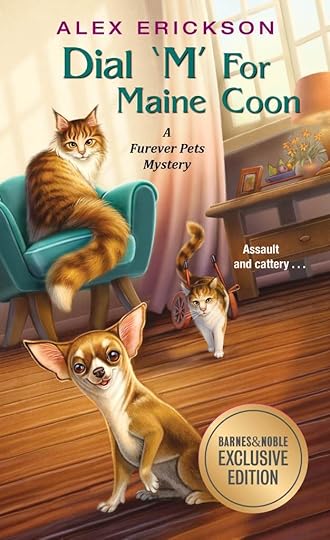
What kind of quirks do your pets exhibit? What makes them, well, them? What gives you gray hairs or cuts and scratches that you wear like badges of honor? My kitties can’t be the only troublemakers out there.
Can they?
Alex Erickson is the author of the Bookstore Café and the Furever Pets mysteries. He’s a gamer, animal lover, and a not so good guitar player. You can find him online at https://alexericksonbooks.com/
September 9, 2021
Welcome Hannah Dennison
By Liz, happy to welcome Hannah Dennison to the blog today! I met Hannah at a recent virtual Cozy Con and she was so much fun I had to invite her here to chat with all of you. Welcome, Hannah!
I’m thrilled to be a guest on Wicked Authors today. I suspect this would never have happened had it not been for meeting Liz in cyberspace at Cozy Con at the Poisoned Pen in Scottsdale. Thank you, Liz!
One of the plus sides of the pandemic (and somehow, we must find them,) is the “new-normal” of virtual author events. After twenty-five years living in California and Oregon, I moved back home to the UK and was concerned that I would vanish into the ether. Au contraire! Now I can stay active in the mystery community from the comfort of my own armchair and, of course, because English time is always hours ahead of the USA, usually with a glass of wine!
Speaking of being an armchair traveler, my initial research for my new series—the Island Sisters Mysteries that are set in the Isles of Scilly—was done just like that. The Isles of Scilly—the locals call themselves “Scillonians” and the islands, “Scilly” but never the Scilly Isles (semantics, I know, oh and it’s pronounced silly), are an archipelago just twenty-eight miles off the Cornish coast of England—Poldark country for Aidan Turner fans.
I had never been to Scilly, nor had I ever planned to visit until my sister introduced me to her friend Gill Knight who had worked as the HR director on Tresco, a luxury resort on one of the five inhabited islands. Gill told me that Tresco—an island that measures a mere two miles long by one mile wide—has no streetlights, no cars, no police presence and that the nearest hospital was a twenty-minute boat ride to the main island of St. Mary’s. As an aside, when Gill went into labor with her first child, she was whisked to the hospital by the coastguard. Gill added that many of the seasonal workers who came to work on the islands were either hiding from something or running away from someone. I couldn’t think of a better setting for a mystery series and naturally, I had to include my sister.
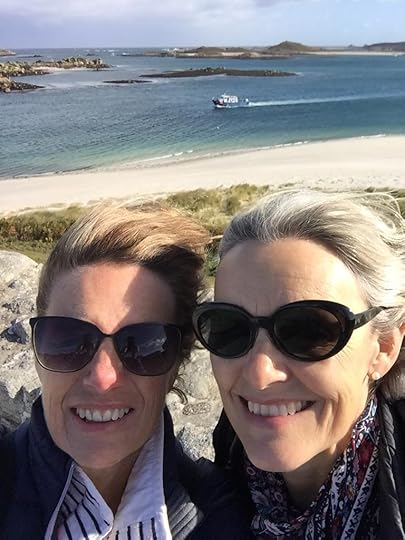
I wrote a few drafts relying heavily on Google Earth, YouTube and a gazillion documentaries. I was happy with my fictional island that I christened Tregarrick Rock and pleased (always a bad sign) with all the cultural and historical nuances, that is, until I got an invitation to go to Scilly.
It’s a bit of a trek that entails either a five-hour train ride from London to Penzance, followed by a two-and-three-quarter hour ferry crossing (the ferry is nicknamed the Great White Stomach Pump for obvious reasons) and then a water taxi from the main island. There are options to fly by plane or helicopter, but the weather can be unpredictable especially off-season when there is a lot of fog. It was only when my feet touched the ground on Tresco that I realized just how much I hadn’t captured from my armchair research.
I had described everything as I had imagined it to be but when I got there, the visceral experience of breathing the fresh air, walking the wild northern part of the island (which is like the Scottish Highlands) or sitting in the Abbey Gardens (which is like the South of France), affected me deeply. And of course, who wouldn’t be affected by the history of the place with the dozens of shipwrecks that litter the surrounding ocean floor along with the seventeenth century castle ruins—a stark reminder that the brutal English Civil War even reached Scilly.
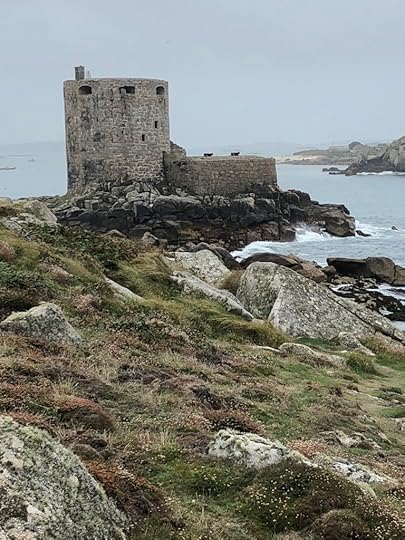
There was also a sense of isolation and remoteness; mystery and magic that I could never experience from my sitting room to say nothing of seeing a variety of rare birds with exotic names like Lesser Yellowlegs and Woodchat Shrikes! The flora and fauna were breath-taking—Scilly’s well known for exporting scented narcissi around the world. I had to incorporate all these elements into the series!
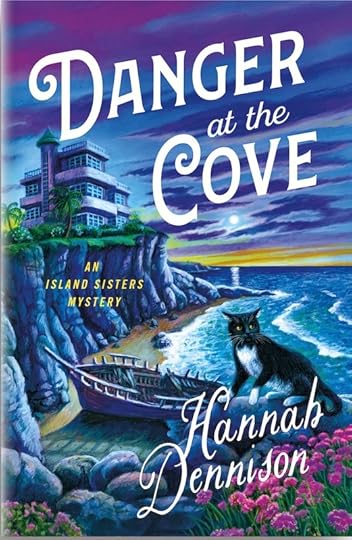
The Island Sisters are about two sisters in their thirties, amateur photographer Evie Mead, and Margot Chandler, a former Hollywood producer. Evie is newly widowed, and Margot recently divorced so the pair are forced to start over. In Death at High Tide (book 1), Evie discovers she has inherited a crumbling Art Deco hotel that was inspired by the real Burgh Island hotel in Bigbury-on-Sea—which I have visited many times! The hotel sits at the end of a sandy causeway and is only accessible on foot at low tide or by a bizarre contraption called a Sea Tractor. In Danger at the Cove, the latest adventure, the sisters are frantically preparing for the grand re-opening of Tregarrick Rock. Things were looking good until a surprise visitor from Margot’s past makes an appearance and murder and mayhem ensue.


Happily, the Islands are part of the British Isles and currently not hampered by Covid-19 quarantine rules for Brits which means that I am heading there next month for a week and happily, my sister—who is nothing like Margot— is joining me. Let’s hope we don’t discover any dead bodies.
Readers, do you have any memorable trips, work or pleasure? Leave a comment below!
Hannah’s Bio
British born, Hannah originally moved to Los Angeles to pursue screenwriting. She has been an obituary reporter, antique dealer, private jet flight attendant and Hollywood story analyst. Hannah has served on numerous judging committees for Mystery Writers of America and teaches mystery writing workshops for the UCLA Extension Writers’ Program now on Zoom. After twenty-five years living on the West Coast, Hannah returned to the UK where she shares her life with two high-spirited Hungarian Vizslas.
Hannah writes the Island Sisters Mysteries (Minotaur), the Honeychurch Hall Mysteries (Constable) and the Vicky Hill Mysteries (Constable)
Social Media Links
https://www.hannahdennison.com
https://twitter.com/HannahLDennison
http://instagram.com/hannahdennisonbooks
https://www.facebook.com/HannahDennisonBooks/
Cozy Con at the Poisoned Pen Podcast

